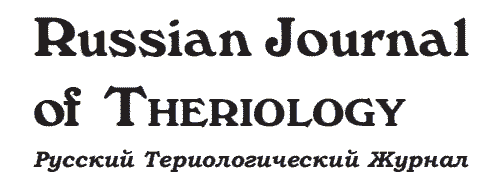New record of anchithere (Anchitherium aurelianense) in the Miocene of Eastern Siberia, Russia
Klementiev A.M., Sizov A.V.
P. 133-143
New material on anchithere is described from Miocene of Eastern Siberia (Tagay locality, Olkhon Island, Lake Baikal). Based on the structure of teeth and postcranial bones, the Baikalian record is referred to the widespread Eurasian species Anchitherium aurelianense. This form shows low crowned lophodont type teeth without cement. Metaloph is mostly connected with ectoloph, protoloph does not connect with ectoloph; secondary structures of the anterior wall of metaloph (crochet) are not developed or incipient. The Early Miocene age of the Siberian anchithere is inferred from the archaic skeletal morphology and comparison with European and Asian records.
DOI: 10.15298/rusjtheriol.14.2.02References- Abusch-Siewert S. 1983. Gebißmorphologische Untersuchungen an eurasiatischen Anchitherien (Equidae, Mammalia) unter besonderer Berucksichtigung der Fundstelle Sandelzhausen // Courier Forschungsinstitut Senckenberg. No.62. P.1-361.
- Alberdi M. T., Ginsburg L. & Rodríguez J. 2004. Anchitherium aurelianense (Mammalia, Equidae) (Cuvier, 1825) dans l’Orléanien (Miocène) de France // Geodiversitas. Vol.26. P.115–155.
- Alberdi M.T. & Rodríguez J. 2012. Anchitherium Meyer, 1844 (Perissodactyla, Equidae) de Sansan // Peigne S. & Sen S. (eds.). Mammifères de Sansan. Muséum national d’Histoire naturelle. Paris. Mémoires du Muséum national d’Histoire naturelle. No.203. P.487–533.
- Belyaeva E.I. 1954. [About finds anchitherium in Kazakhstan] // Trudy Paleontologicheskogo Instituta AN SSSR. Vol.47. P.55-60 [in Russian].
- Borissiak A. 1945. [On the Equidae from the Middle Miocene of Northern Caucasus] // Trudy Paleontologicheskogo Instituta AN SSSR. Vol.13. No.1. P.1-52 [in Russian].
- Bryant J.D. 2001. New Early Barstovian (Middle Miocene) Vertebrates from the Upper Torreya Formation, Eastern Florida Panhandle // Journal of Vertebrate Paleontology. Vol.11. No.4. P.472-489.
- Colbert E.H. 1939. A New Anchitheriine horse from the Tung Gur Fomation of Mongolia // Amer. Mus. Novitates. No.1019. P.1-9.
- Danilov I.G., Syromyatnikova E.V., Klementiev A.M., Sizov A.V., Martynovich N.V., Zelenkov N.V., Sychevskaya E.K. & Tesakov A.S. 2012. [New data on the Miocene vertebrate location Tagay (Olkhon, Lake Baikal)] // Modern Paleontology: classical and new methods. Moscow: Paleontological Institute RAS. P.19-20 [in Russian].
- Daxner-Höck G., Badamgaarav D., Erbajeva M. & Göhlich U.B. 2013. Miocene Mammal Biostratigraphy of Central Mongolia (Valley of Lakes): new results // Wang X.-M., Flynn L.J. & Fortelius M. (eds.). Fossil Mammals of Asia: Neogene Biostratigraphy and Chronology. New
York: Columbia University Press. P.476–494.
- Evander R.L. 2004. A revised dental nomenclature for fossil horses // Bulletin of the American Museum of Natural History. No.285. P.209-218.
- Iñigo C. 1997. Anchitherium corcolense nov. sp., a newanchitherine (Equidae, Mammalia) from the Early Aragonian site of Córcoles (Guadalajara, Spain) // Geobios. Vol.30. No.6. P.849–869.
- Ivanjev L.N. 1960. [Hipparion fauna of Transbaikalia and West Cisbaikalia] // Materials for the Conference on terrestrial zoogeography. Alma-Ata: Izdatel'stvo AN Kazakhskoi SSR. P.51-52 [in Russian].
- Forsten A. 1990. Anchitherium from Pasalar, Turkey // Journal of Human Evolution. Vol.19. P.471-478.
- Forsten A. 1991. Size trends in holarctic Anchitherines (Mammalia, Equidae) // Journal of Paleontology. Vol.65. No.1. P.147-159.
- Gabunia L.K. 1973. [Belomechetskaya fauna of fossil vertebrates]. Tbilisi: Metsniireba. 147 p. [in Russian].
- Gromova V.I. 1949. [History of horses (genus Equus) in the Old World, part 2] // Trudy Paleontologicheskogo Instituta AN SSSR. Vol.17. P.1-164 [in Russian].
- Gromova V.I. 1952. [New discoveries of anchithere in Mongolia] // Trudy Paleontologicheskogo Instituta Akademii Nauk SSSR. Vol.41. P.87-98 [in Russian].
- Hammer Ø., Harper D.A.T., Ryan P.D., 2001. PAST: Paleontological Statistics software package for education and data analysis // Palaeontologia Electronica. Vol.4. No.1. 9 p.
- Kovalevsky W. 1873. Sur l'Anchitherium aurelianense Cuv. et sur l'Histoire Palйontologique des Chevaux // Mйm. Acad. Imp. Sci. St.-Pйtersbourg, 7 sйr. Vol.20. No.5. P.1-73.
- Kovalevsky W.O. 1948. [Paleontology of horses]. Moscow: Izdatel'stvo AN SSSR. 356 p. [in Russian].
- Logachev N.A., Lomonosova T.K., Klimanova V.M. 1964. [The Cenozoic deposits of the Irkutsk Amphitheatre]. Moscow: Nauka Press. 196 p. [in Russian].
- MacFadden B.J. 1998. Equidae // Janis C.M., Scott K.M., Louis L.J. (eds.). Evolution of Tertiary Mammals North America. Vol. 1. Cambridge: Cambridge University Press. P.537-559.
- Mats V.D., Ufimtsev G.F., Mandelbaum M.M., Alakshin A.M., Pospeev A.V., Shimaraev M.N. & Khlystov O.M. 2001. [Cenozoic of the Baikal Rift Zone]. Novosibirsk: Izdatel'stvo SO RAN, branch 'GEO'. 252 p. [in Russian].
- Miyata K. & Tomida Y. 2010. Anchitherium (Mammalia, Perissodactyla, Equidae) from the Early Miocene Hiramaki Formation, Gifu Prefecture, Japan, and its implication for the early diversification of Asian Anchitherium // Journal of Paleontology. Vol.84. No.4. P.763-773.
- Osborn H.F. 1918. Equidae of the Oligocene, Miocene and Pliocene of North America, iconographic type revision // Memoirs of the American Museum of Natural History, new ser. Vol.2. Part 1. P.1-331.
- Stirton R.A. 1941. Development of characters in horse teeth and the dental nomenclature // Journal of Mammalogy. Vol.22. P.434-446.
- Tesakov A.S. & Lopatin A.V. 2015. First record of Mylagaulid rodents (Rodentia, Mammalia) from the Miocene of Eastern Siberia (Olkhon Island, Baikal Lake, Irkutsk Region, Russia) // Doklady Biological Sciences. Vol.460. P.23-26.
- Tesakov A.S., Syromyatnikova E.V., Danilov I.G., Klementiev A.M., Sizov A.V., Zelenkov N.V., Sychevskaya E.K., Lopatin A.V., van den Hoek Ostende L.W., Martynovich N.V., Volkova N.V. & Obraztsova E.M. 2014. [Progress in the study of Miocene vertebrates of Tagay (Olkhon Island, lake Baikal)] // Paleontology of Central Asia and adjacent regions: 45 years of the joint Russian-Mongolian Paleontological Expedition. Moscow: Paleontological Institute RAS. P.75-77 [in Russian].
- Tleuberdina P. & Forsten A. 2001. Anchitherium (Mammalia, Equidae) from Kazakhstan, Central Asia // Geobios. Vol.34. No.4. P.449-456.
- Vislobokova I.A. 1990. [About artiodactyls from the Lower Miocene of the Tagay bay, Olkhon island (Baikal)] // Paleontological Journal AN SSSR. No.2. P.134-138 [in Russian].
- Vislobokova I. 1994. The Lower Miocene artiodactyls of Tagay Bay, Olhon Island, Lake Baikal (Russia) // Palaeovertebrata. Vol.23. P.177-197.
- Ye J., Wu W.Y. & Meng J. 2005. Anchitherium from the Middle Miocene Halamagai Formation of Northern Junggar Basin, Xinjiang // Vertebrata PalAsiatica. Vol.43. No.2. P.100-109.
Download PDF
|

